How To Get Better Tasting Water in Arizona
October 15, 2021
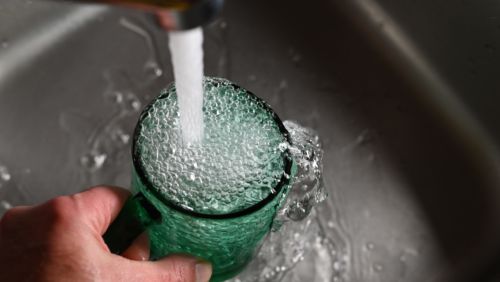
Use a water filtration system to improve your tap water’s taste
In Arizona, we’re fortunate that our tap water is safe to drink. However, the tap water here is notoriously hard. That means there is a relatively high amount of dissolved minerals in the water- specifically calcium and magnesium. While some people may not mind the hard water, it can leave residue in your shower, washer, toilets, and sinks.
Hard water can also make tap water taste slightly salty or bitter. Other pollutants may be in your water that can make it taste funny as well. Arizona tap water also includes chlorine, salts, fluoride, pesticides, and cleaning solvents.
If you aren’t a fan of the taste of your tap water, you have options beyond spending hundreds of dollars a year on bottled water. In this blog, we’ll discuss the two types of water filtration systems you can get for your home to improve the taste of your water and some of the other options available to you, including:
- Water filter pitchers
- Faucet-mounted water filters
- Under-sink filters
- Whole-home water filtration systems
At Patrick Riley, we know water filtration. We’ll give you an expert professional recommendation for which water filtration system best fits your needs with upfront pricing, flexible payment options, and a 100% satisfaction guarantee. Call us today at 602.280.1793or schedule a free estimate online.
Types of water filtration systems
Before we discuss the filtration options, let’s break down the types of systems available. There are two types of water filtration systems:
- Point-of-entry systems
- Point-of-use systems
Point-of-entry systems filter water in a filtration unit before it enters your home. These systems are more expensive than the alternatives, but they are more cost-effective if you’re considering filtering water on multiple taps, faucets, and appliances in your home.
On the other hand, point-of-use systems are filtration systems installed directly on a single faucet or appliance. These systems are effective and less expensive than a point-of-entry system, but they can only clean and filter the water in one location in your home.
Water filter pitchers
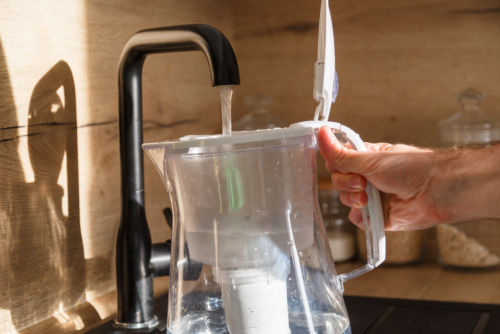
You can buy a water filter pitcher to improve your water’s taste
A water filter pitcher is a point-of-use system and a free-standing pitcher. You fill it from the top with tap water that passes through a built-in filter to get to a reservoir. Then, you can pour out the filtered water for drinking or other uses. Water filter pitchers are inexpensive, require no installation, and are easy to use. The filters must be replaced every 3 to 6 months (or every 120 gallons of water filtered for most brands) when they get dirty, but they’re an excellent short-term option for improving the taste of your tap water.
Faucet-mounted water filters
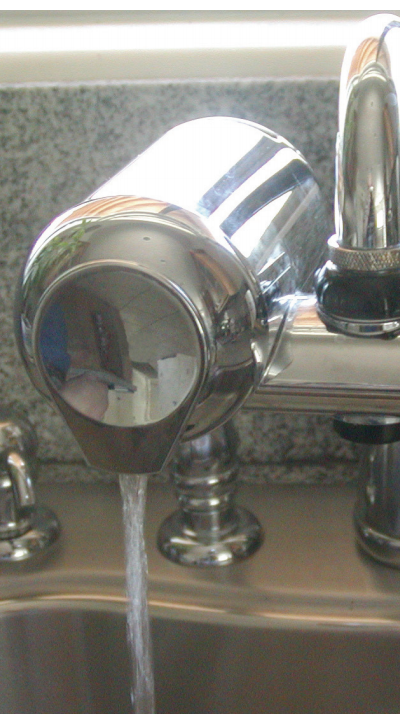
Faucet-mounted water filters make it easy to have better tasting water / Source: AZ Department of Health Services
A faucet-mounted water filter is a point-of-use system that is attached directly to a single faucet. It can be switched off or on to deliver unfiltered or filtered water easily, and these devices are a relatively inexpensive way to improve the taste of your tap water on demand. However, they do not fit on all faucets, can be bulky depending on their filter size, and slow down a faucet’s flow rate.
Under-sink filters
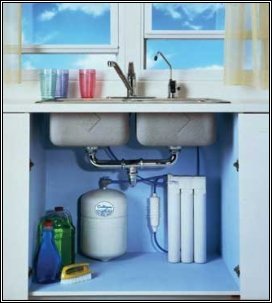
Under-sink water filters improve the taste of your water / Source: AZ Department of Environmental Quality
These water filtration systems are point-of-use systems installed directly under a sink. They filter water before it reaches the faucet, improving the taste and reducing mineral concentrations. Also, they’re capable of filtering large amounts of water, and they do not take up counter space. However, these filters may require modifications to your existing plumbing and can be expensive to purchase and install.
A standard under-sink filtration system is reverse osmosis. This system uses a series of filters and a storage tank to filter out sediment, chemicals, minerals, and salts from the water before they reach your tap.
Whole-home water filtration systems
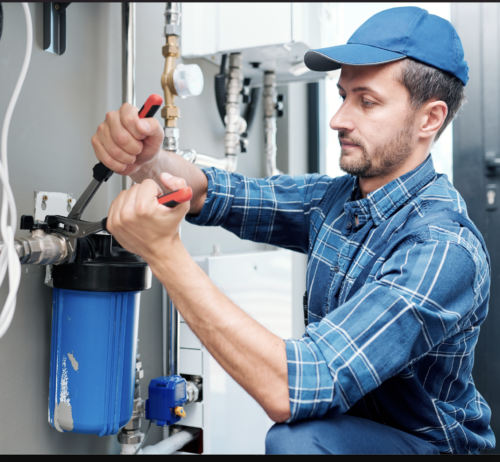
Hire a plumber to install a whole-home water filtration system
The whole-home water filtration system is a point-of-entry system. Since it filters the water from your main water line before that water enters your home, you can rest assured that every shower, sink, toilet, and appliance in your home is getting clean and filtered water.
It’s easy to customize these systems to filter out the things that most affect your drinking water where you live. Whole-home water filtration systems will vary in complexity and what they can filter. For example, you may want to specifically reduce hardness, remove sediment and dirt, or reduce the taste or smell of chlorine in your water.
Based on what you want to filter, your plumber can suggest one of several systems that will work for your home.
Water Softener Systems
A water softener is a larger filtration system that removes water-hardening minerals like calcium and magnesium. They use sodium chloride (salt) tablets in a large holding tank to filter water from the main water line as it enters your home. The process is known as ion exchange.
UV Water Purification Systems
Ultraviolet water purification systems use ultraviolet (UV) light to kill living organisms in your water like fungus, bacteria, viruses, and parasites. Unfiltered water enters one end of a canister, passes over the UV light source that kills off living organisms, and then exits the canister to circulate throughout your home.
Sediment and Carbon Filters
If you have issues with sediment in your water, a sediment filter specifically traps and removes things like clay, sand, and rust from old pipes. And if you have highly chlorinated water, a carbon filter can help remove the smell and taste from your water supply before it enters your home. Carbon filters are also effective at removing pesticides and other harmful agricultural chemicals from water sources.
Do you want the best possible water for your entire home? Call the experts at Patrick Riley today!
We have various water filtration systems available and can help you find the right one for your home. In Phoenix, call 602.280.1793 or schedule your free estimate online.
Get 10% off (Up to $150)

Ty Lindsay is the Director of Field Operations at Patrick Riley | Isley’s and a 15-year veteran of the plumbing and HVAC trades. In 2010, Ty earned his Journeyman’s plumbing license. He became a Master Plumber five years later and earned his Journeyman HVAC technician’s license that same year. Ty’s breadth of knowledge in plumbing and HVAC includes both residential and commercial work. He’s been a loyal member of the Patrick Riley | Isley’s team since 2016.
- Posted in:
- Tips
